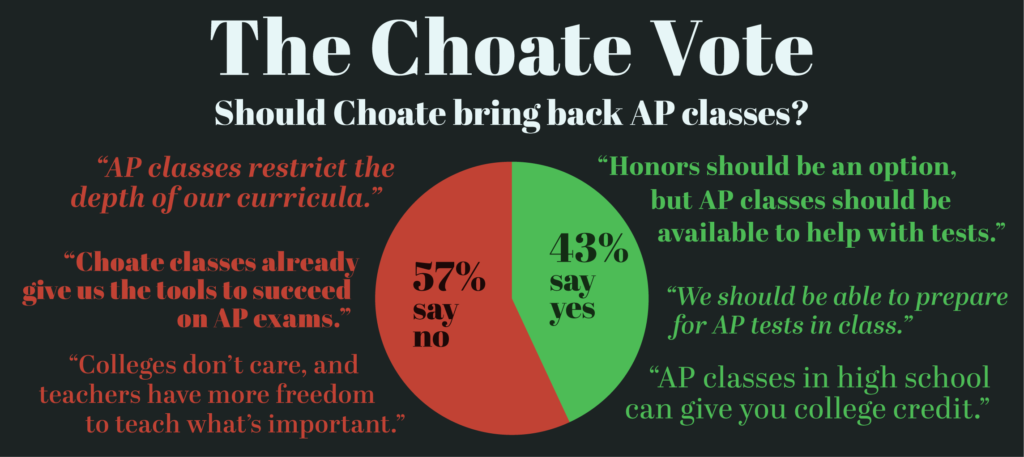Choate is once again amid the frenzy of Advanced Placement tests. The exams began last week, and continue into the next. And so I’ve been wondering a lot lately if Choate made the correct decision in getting rid of AP classes. The School hasn’t officially taught an AP course since the fall of 2017.
Because the Choate curriculum does not always align with the AP curriculum, students are forced to study for AP tests on their own. For me, this meant buying a test prep book and reviewing a term’s worth of material — all of which has added up to dozens of additional hours of studying. But is that extra work really a problem? I don’t think so. The benefits largely outweigh the costs.
If the end goal of Choate’s curriculum was to help students get a good score on as many AP tests as possible, then maintaining the AP curriculum would obviously have been the wiser choice. I believe, however, that high scores on standardized tests shouldn’t be the goal of a good education.
By getting rid of the AP curriculum, the School has freed teachers from the restrictions that result from strictly adhering to a standardized curriculum. Teachers can choose to teach close to the AP curriculum or create their own lesson plans. Without the weight of the AP curriculum, they possess the power to do what they believe is best for their students, instead of robotically preparing them for a test.
The main problem that arises here is that many students still wish to take AP tests, as the assessments remain an integral part of the college-admissions process. Although I dislike the idea of simply doing something for the sake of getting into college, AP tests are important because they allow colleges to compare students from different systems of education, and give students an opportunity to earn college credits before getting to college. Standardized testing — including not just the AP exams but also the ACT and SAT — make up an important part of the college-admissions process, giving students an opportunity to prove their academic abilities on a nationally standardized scale.
But that in itself doesn’t give us reason to keep an AP curriculum. Students can achieve high AP scores without necessarily being in AP-designated courses. There are a few ways to ensure this.
All classes that are equivalent to previous AP classes, or those that have a high number of students who will take an AP test in that subject, should offer some form of test prep. I know this is the case for Macro- and Microeconomics, in which students are typically given some practice problems structured similarly to those on the AP test. Teachers should also be encouraged to offer extra help sessions that focus specifically on preparing students for AP tests.
While this may seem like extra work for both teachers and students, almost every former AP class is teaching material that is similar to what it taught before. It’s not as though classes without the AP designation are teaching completely different subjects.
Over the past few weeks, as I prepared for the Macroeconomics AP exam, I recognized most of the content in the test prep book. Furthermore, I think the Macroeconomics class at Choate gave me an even more in-depth understanding of the material — an understanding of a subject that I can apply outside of a standardized test.
Ultimately, Choate’s choice to get rid of the AP curriculum was a good one. If the only goal of a good education is for students to score well on AP tests, then Choate will be unable to differentiate itself from other schools. It’s the depth and breadth of our education that matters.
Without a forced AP curriculum, Choate’s classes can provide both valuable content and the tools to score well on the standardized test. It’s a win-win.





